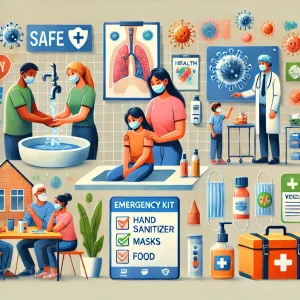
The COVID-19 pandemic has highlighted the importance of preparedness and vigilance in managing public health crises. As the world continues to recover, it is essential to adopt practices that will not only help mitigate the current pandemic but also prepare us for future outbreaks. Here are key strategies to stay safe and resilient in the face of emerging health threats.
1. Stay Informed and Educated Knowledge is power when it comes to managing outbreaks. Stay updated on reliable sources such as the World Health Organization (WHO) and your local health department. Understanding the nature of infectious diseases, their modes of transmission, and recommended preventive measures can empower individuals to make informed decisions. Avoid misinformation by verifying facts before sharing them.
2. Maintain Personal Hygiene Good personal hygiene remains one of the simplest yet most effective ways to prevent the spread of infectious diseases. Regularly wash your hands with soap and water for at least 20 seconds, especially after being in public spaces or touching shared surfaces. Use hand sanitizer when soap and water are unavailable. Avoid touching your face, particularly your eyes, nose, and mouth, as these are entry points for viruses.
3. Practice Respiratory Etiquette Coughing or sneezing into a tissue or your elbow helps minimize the spread of respiratory droplets, which are a primary mode of transmission for many diseases. Dispose of used tissues properly and wash your hands immediately afterward. Wearing a mask in crowded or high-risk areas can also reduce the risk of infection.
4. Strengthen Immunity A robust immune system can provide better protection against illnesses. Maintain a healthy lifestyle by eating a balanced diet rich in fruits, vegetables, and lean proteins. Stay physically active, get adequate sleep, and manage stress through relaxation techniques or mindfulness practices. Consider vaccinations as recommended by health professionals to protect against specific diseases.
5. Embrace Technology for Health Monitoring Digital tools and apps have become vital in tracking and controlling outbreaks. Use health apps to monitor symptoms, receive updates on local infection rates, or access telemedicine services for medical advice. Contact-tracing apps, where available, can help identify potential exposure to infectious diseases.
6. Prepare for Emergencies Being prepared can reduce the impact of future outbreaks. Create an emergency kit that includes essentials like masks, hand sanitizers, medications, and non-perishable food. Develop a family communication plan and familiarize yourself with local emergency response protocols.
7. Promote Community Health Individual actions have a collective impact. Encourage your community to adopt healthy practices and support public health initiatives. Volunteering, donating resources, or simply spreading accurate information can strengthen community resilience.
8. Advocate for Better Public Health Systems Policymakers and institutions play a critical role in preventing and managing outbreaks. Advocate for investments in healthcare infrastructure, research, and disease surveillance systems. Equitable access to healthcare and vaccines ensures that vulnerable populations are not left behind.
Conclusion The lessons learned from COVID-19 must guide our approach to future outbreaks. By staying informed, practicing good hygiene, and fostering a culture of preparedness, individuals and communities can build resilience against health crises.